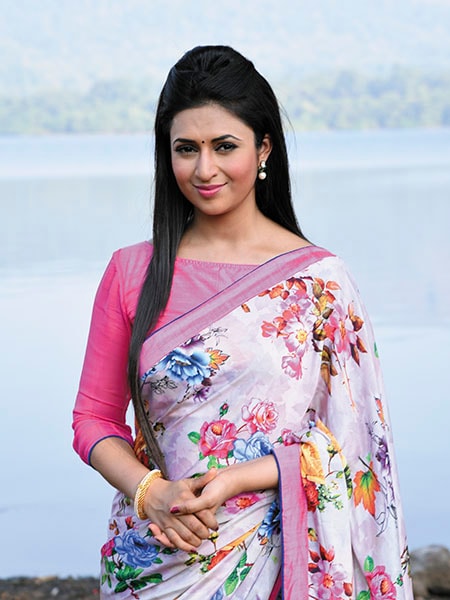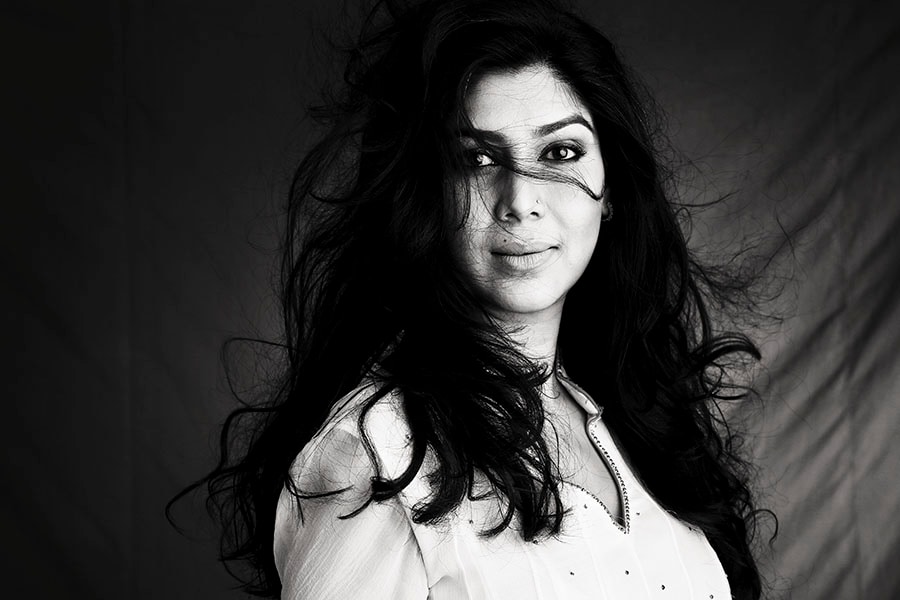
The leading lights of the small screen
Far from the glitter of mainstream cinema, there is talent galore on TV, revving up viewership and revenues of general entertainment channels

A Shooting Star
It’s been a decade since her first lead role, but Divyanka Tripathi still rules the roost on TV
She is a gold medallist in riflery from the Bhopal District Rifle Club, has undergone training at the Nehru Institute of Mountaineering in Uttarkashi, Uttarakhand, learnt parasailing professionally, knows jet skiing, and, once aspired to work for the Indian Forest Service. “I was an NCC [National Cadet Corps] cadet. Acting was just time-pass,” says Divyanka Tripathi, 31, who used to take up endorsements and modelling assignments in Bhopal, her hometown, as a teenager.
An odd contrast, given that today, she is among the most popular actors on Indian television. From playing the ‘ideal’ bahu (daughter-in-law) to taking up roles in comedy-based shows and now essaying the character of Dr Ishita Bhalla in the Star Plus soap opera Yeh Hai Mohabbatein, Tripathi has managed to woo the audience in every role. Dr Ishita Bhalla was ranked No 1 on the ‘Top five fiction characters on Hindi GECs’ (General Entertainment Channels) list in the 2016 Ficci-KPMG report on the media and entertainment industry.
“And that was exactly the plan,” she tells Forbes India while returning home late on a November evening, from the sets of Yeh Hai Mohabbatein in Andheri, Mumbai, after a gruelling 12-hour shoot. “Every time people attempt to typecast me, I try and break away from it,” says Tripathi, who has also proved her worth in several talent-based reality shows.
In 2000, she signed up for Doordarshan’s telefilms. It was her telefilm co-actor Prashant Chawla, who recommended her name for the lead role in Zee TV’s Banoo Main Teri Dulhann in 2006. “I got a call from Zee, and thought it was a hoax,” says Tripathi, who eventually bagged the role.
Ten years on, she is still at the top of her game. “Yeh Hai Mohabbatein has been Star Plus’s flagship show and has consistently featured among the top five shows in the [Hindi GEC] category since its launch in 2013,” says a Star India spokesperson. “What makes Dr Ishita Bhalla so popular and aspirational to viewers is that the character embodies the modern-day woman, with her progressive outlook, the maturity to handle and solve problems, and pursue a successful career, while being the ideal mother, wife and daughter-in-law,” he adds.
Tripathi, though, is aware of the fickleness of fame. “Events, endorsements and appearances come to you only as long as the show is on. So it is important to save money, because nobody comes to help actors,” she points out.
People often ask her when will she take the leap from the small screen to the big screen. “My strength is Indianness. I will do films if there is a good role, but let them move away from the ‘glam doll’ image first. I am not cut out for those, and even if I do it, neither I nor my audience will be satisfied,” she explains.
Instead, she says, she is a proud television actor. “I feel that television actors are much more hardworking and polished than other actors. We get the script ten minutes before the shoot, and we memorise five-page scripts in as many minutes,” she says. At times, the pressure to get an episode ready also means having to shoot despite being unwell. “I once fractured my leg during a dance rehearsal, so we just incorporated an accident scene in the story and I continued shooting on a wheelchair,” she recalls.
Like adventure sports, Tripathi says, this industry is tough. It tests you every single day; there is less work and more competition. “But I want to ensure that I never lose my essence. That, for me, would be success.”

Snakes And Ladders
Mouni Roy has slithered her way into viewers’ hearts and up the ratings chart
When Mouni Roy was offered the role of a naagin (snake-woman), a shape-shifting serpent trying to avenge the death of her parents in Balaji Telefilms’ eponymous show, she refused. She had played Goddess Sati in Life OK’s Devon Ke Dev...Mahadev, and did not wish to be typecast. But, as Roy puts it, “when [producer] Ekta [Kapoor] ma’am talks, you are mesmerised. When I heard her, I knew I had to do it.”
Roy, 31, is still in her costume, a golden dress with snake-shaped jewellery and brown contact lenses, as she speaks to Forbes India from the shoot of Naagin at an old bungalow inside Filmcity in Goregaon, Mumbai. A typical day for Roy entails at least 12 hours of shooting. “I haven’t taken a single day’s leave since the second season started airing [in October 2016],” she says. She attributes her enthusiasm to her passion for acting. The results are evident. Ratings by the Broadcast Audience Research Council—the body that monitors viewership habits of Indian households—show that Naagin has consistently been among the top five shows viewed in India.
Following Naagin’s success, similar shows based on supernatural themes emerged. While Naagin’s critics termed the show regressive, Roy feels there’s nothing wrong with it. “We are doing fantasy fiction. We are not trying to make it regressive or propagate something which doesn’t exist. We watch Twilight, Vampire Diaries and Game of Thrones, so this is also fiction, Indian fiction.”
Acting, however, wasn’t always Roy’s calling—she aspired to become an IAS officer. Born in West Bengal’s Cooch Behar district, Roy belongs to a conservative Bengali family. Her late father, Anil Chandra Roy, was a civil services officer, while mother Mukti Roy is a teacher. “As a Bengali, you are supposed to sing, dance and paint, but those are supposed to be hobbies. Not your profession,” says Roy, who completed her BA from Delhi’s Miranda House and followed it up with an MA in Mass Communication from Jamia Millia Islamia university.
It was while she was pursuing her MA that acting beckoned. “Somebody from Balaji [Telefilms] spotted me outside the university and asked me to audition for the role of Krishna Tulsi, the onscreen daughter of Tulsi [played by the now Union minister for textiles Smriti Irani] in Star Plus’s Kyunki Saas Bhi Kabhi Bahu Thi (KSBKBT),” recalls Roy. A few days later, Roy got a confirmation call. Although apprehensive about television being too “melodramatic” and KSBKBT not being a new serial (at that point, the show had been on air for seven years), she went with her gut feeling and moved to Mumbai, terming it a summer job. “I never went back,” she says smiling.
Ekta Kapoor, joint MD, Balaji Telefilms, that produces both KSBKBT and Naagin, observes that there is a hunger in Mouni’s demeanour for quality work, something unusual among today’s actors. Kapoor says Roy was apt for the role of Naagin as she “personifies both a damsel in distress as well as a woman full of reprisal”.
Fiction apart, Roy has participated in several reality shows, hosted a show called Telly Talk and done a travel show with Deepti Bhatnagar for NDTV Good Times. She made her Bollywood debut this year in a song in Tum Bin 2, where she showcases her dancing skills. She says that although she is happy with her work in television, she wouldn’t mind a good big screen project.
Roy wishes to foray into other avenues like writing and fashion, but adds that she has never been able to plan what she wants to do in life. “I just do what I am destined to,” she says as she gets ready for her next shot in full earnest. Little wonder then that destiny has favoured her.

Holding Her Own
Sakshi Tanwar leaves most things to chance, but her passion for acting has ensured that prime roles find her
In 1998, Sakshi Tanwar, who was preparing for the Indian Administrative Services, got an urgent call from her college friend Supriya, who hosted the music-based show Albela Sur Mela on Doordarshan. Supriya’s co-anchor hadn’t reported to the sets that day and she wanted Tanwar to step in. “I was free, so I went. The requirement was a good command over Hindi and the ability to memorise dialogues. Since I could manage both, I was on,” recalls Tanwar, who was born in Alwar, Rajasthan, and later pursued her graduation from Delhi’s Lady Shri Ram College. What she didn’t realise then was that this would be the beginning of her television career.
“I was more excited about earning Rs 500 for that anchoring,” she laughs.
Tanwar discovered her passion for acting while shooting for Rajdhani, a weekly show for Star Plus, in May 2000. “It was during a scene that I realised that acting is much more than just delivering dialogues. I realised it’s a process which needed me to transform into another character. I enjoyed it so much that I wanted more of it. That’s when I realised that I wanted to pursue acting as a profession,” says Tanwar. Since then, she has been a part of several hit shows, the most notable ones being Kahaani Ghar Ghar Kii on Star Plus, which ran for eight years, and Bade Acche Lagte Hain on Sony Entertainment TV, which ran for over three years. She has also hosted crime shows like Crime Patrol on Sony and Code Red on Colors TV (part of Network 18, the publishers of Forbes India), and endorses over eight brands. This year, she was also a part of Anil Kapoor’s finite series, 24, aired on Colors TV and is now preparing to reunite with her former co-star Ram Kapoor for Ekta Kapoor’s upcoming web series.
Tanwar also makes her Bollywood debut opposite Aamir Khan, as his onscreen wife, in Dangal. The film is a biopic on Mahavir Singh Phogat, a senior Olympics coach who taught wrestling to his daughters Geeta Phogat and Babita Kumari, who went on to win medals at the Commonwealth Games. “It was as unplanned as everything else in my life,” says Tanwar about her film debut. “I don’t think I am ambitious but I do cherish and savour what I do and what I have done.”
“The beauty was that once she was briefed during the audition on what was expected from her, she got the role just like that. Even when she is not speaking on screen, her face is saying a thousand words. She has proved that you need not have a line in a scene to leave a major impact,” says Nitesh Tiwari, director of Dangal.
As far as possible, Tanwar tries to work on one show at a time, taking long breaks once it is over. When she isn’t working, she loves to travel and spend time with her family. “That helps me detach from the routine and do something which is not only different but also exciting. The idea is not just to grow as a professional but also as a person,” she explains.
Tanwar is now itching to do more finite shows. “At a time when it is believed that television content is created largely for the masses in the country’s interiors, it is relevant and important that finite shows like 24 and POW: Bandi Yuddh Ke [aired on Star Plus] are telecast along with soaps and serials,” she says. Her dream role is to play Charulata (from the eponymous Satyajit Ray film), Rosy (from RK Narayan’s The Guide) or chhoti bahu (from the 1962 Hindi film Sahib Bibi aur Ghulam). “I wish I was a part of at least one black and white classic of the ’50s and ’60s,” she signs off wistfully.
X





